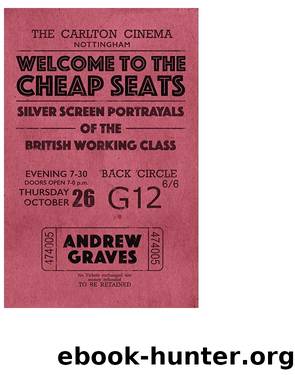Welcome to the Cheap Seats by Andrew Graves

Author:Andrew Graves
Language: eng
Format: epub
ISBN: 9781910170731
Publisher: Five Leaves Publications
Published: 2019-09-17T00:00:00+00:00
But when that hope is torn asunder in the filmâs climax, we are torn apart too. Jud, gruff and spiteful, bent out of shape by his lack of opportunity, vents his frustration on his mother and her string of boyfriends and his younger brother Billy. Like countless others he washes away the bitter taste in his mouth with copious amounts of alehouse bitter and gambles whatâs left of his wages on dodgy nags at the local bookies. In some ways, itâs hard not to feel sorry for Jud. He is, of course, a victim of the same one-way contamination which blights Billyâs life, but the vindictiveness he shows in the final reel of the film is hard to forgive.
When Jud leaves instructions for his younger sibling, already busy with school and two daily paper rounds, to place a bet for him, Billy, sensing the odds will not go in Judâs favour, spends the stake money instead. The would-be bet comes good and Jud is left severely out of pocket. âI could have had a week off work with that.â Out on the rampage, Jud first goes to Billyâs school and when he is unable to find him he stalks away with rage in his eyes. It is not until Billy returns home that we understand the full level of Judâs cruelty. He has taken Billyâs beloved Kes, wrung its neck and left it in the bin.
The once-impressive bird is now a limp and lifeless shell, left to rot alongside old newspapers and dented baked bean tins. Itâs a fitting metaphor for Billyâs own closed-in future of clanking mechanised dirt and disappointment.
Kes is a hard watch. Which isnât to say that it isnât funny or entertaining or expertly put together, because it definitely is, but the closing moments alone make it all the more challenging, and whatâs more the tragedy is bigger than a dead bird in the rubbish. As terrible as that image is, with everything it represents, we know that Billyâs life, as crappy as it is already, is probably going to get worse, forced through a revolving-door existence of menial work and lack of opportunity, another nameless link in the cycle of constructed poverty, an easy target in an ideological war declared by the powers-that-be and a skewed education policy. As Loach says:
The objective role of a secondary modern is to produce a certain amount of unskilled labour⦠The school and the youth employment officer cannot recognise that [Billy] has qualities, or theyâve got to find someone else to fill his manual job from the pool of eleven-plus failures.
Loachâs most recent film, I, Daniel Blake, was undoubtedly important, shining a light on the governmentâs shocking lack of humanity in failing to provide adequate financial support for those not able to work through sickness or incapability. It was expertly crafted and delivered its own fair share of gut-punching moments, such as the poignant food bank scene where malnourished mother Katie (Hayley Squires), weak with hunger, forces down a mouthful of cold baked beans out of the sight of her two young children.
Download
This site does not store any files on its server. We only index and link to content provided by other sites. Please contact the content providers to delete copyright contents if any and email us, we'll remove relevant links or contents immediately.
| Coloring Books for Grown-Ups | Humor |
| Movies | Performing Arts |
| Pop Culture | Puzzles & Games |
| Radio | Sheet Music & Scores |
| Television | Trivia & Fun Facts |
Spell It Out by David Crystal(36108)
Professional Troublemaker by Luvvie Ajayi Jones(29644)
We're Going to Need More Wine by Gabrielle Union(19029)
The Secret History by Donna Tartt(19023)
Cat's cradle by Kurt Vonnegut(15322)
The Goal (Off-Campus #4) by Elle Kennedy(13646)
The Social Justice Warrior Handbook by Lisa De Pasquale(12182)
The Break by Marian Keyes(9357)
Crazy Rich Asians by Kevin Kwan(9271)
The remains of the day by Kazuo Ishiguro(8964)
Thirteen Reasons Why by Jay Asher(8881)
Educated by Tara Westover(8041)
The handmaid's tale by Margaret Atwood(7749)
Giovanni's Room by James Baldwin(7315)
Win Bigly by Scott Adams(7181)
This Is How You Lose Her by Junot Diaz(6868)
The Rosie Project by Graeme Simsion(6364)
Six Wakes by Mur Lafferty(6231)
The Power of Now: A Guide to Spiritual Enlightenment by Eckhart Tolle(5741)
